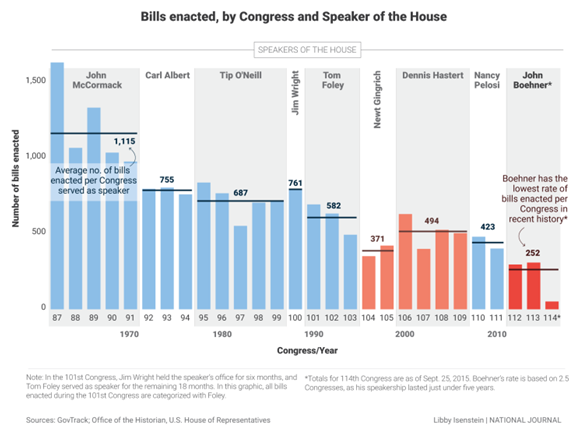Heading into what appears to be his final week of leadership in the House of Representatives, John Boehner will be the subject of no end of retrospective profiles of his career. The 65-year-old Ohioan served just shy of 25 full years in the House and spent nearly five years as speaker.
While Boehner’s legacy extends well beyond his time as speaker – he helped pass the No Child Left Behind Act and major pension reform while chairman of the House Committee on Education and the Workforce – his time leading the House will naturally attract the most attention.
Related: As Debt Limit Approaches, Cracks Appear in the Nation’s Finances
When Boehner unexpectedly announced his resignation last month, his staff began distributing articles and videos celebrating his legacy in office.
They sent out links to an article by Republican operative Karl Rove who, in the pages of The Wall Street Journal, declared Boehner “a quiet leader from America’s heartland who got important things done. He can leave the House content that he gave his all and did the right thing—for conservatism, his party and, most important, his country.”
They linked to articles, like this one in Forbes touting Boehner’s efforts to cut federal spending and another in U.S. News & World Report on his continued work on education reform.
His staff also produced a number of celebratory videos, including this one, about Boehner’s career-long fight against earmarks – dedicated spending inserted into legislation at the request of individual representatives and senators – which culminated in a ban on the practice during his first term as speaker.
Related: Congress Asleep at the Switch as the Debt Ceiling Looms
In the end, though, the measure of a speaker of the House has to be tied to his ability to get that institution to fulfill its most basic function: passing laws. And on that score, Boehner’s legacy won’t really measure up to that of his most recent predecessors.
National Journal’s Libby Isenstein produced the following graphic which clearly illustrates the vast gap in legislative productivity between Boehner’s term and those of the last generation of House Speakers.

Boehner’s speakership, it notes, has the “lowest rate of bills enacted per Congress” going back to the late 1960s.
Related: Did Paul Ryan Outsmart the Freedom Caucus?
Of course, Boehner’s tenure was unique in that it was marked by the rise of the Tea Party – the hard-right element of the GOP that made the obstruction of the expansion of federal power in any form its hallmark and was willing to shut down the government to achieve its goals.
Boehner also never served under a Republican president and for all but the last few months of his speakership faced a Democratic-controlled Senate that frequently stymied the House on issues important to the conservative base.
Indeed, Boehner himself in 2013 explicitly rejected the idea that his speakership ought to be judged on “productivity.”
“We should not be judged on how many new laws we create,” he said. “We ought to be judged on how many laws we repeal.”
Related: As Congress Fails to Act, 1 in 3 Seniors Facing Big Hike in Medicare Premiums
However much Boehner might want to spin it, though, the people elected are called lawmakers, not law repealers, and by almost any measure the two and one half Congresses during which Boehner served as speaker were among the least productive in history.
The lack of legislative activity probably owes as much to circumstance as to Boehner’s skill as a legislator, but it will inevitably remain as part of his legacy.





